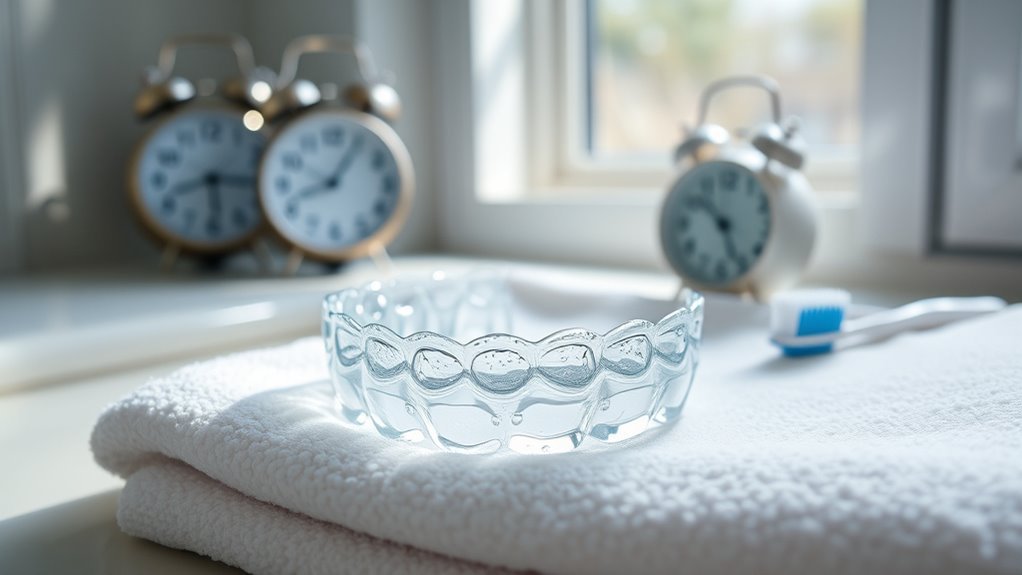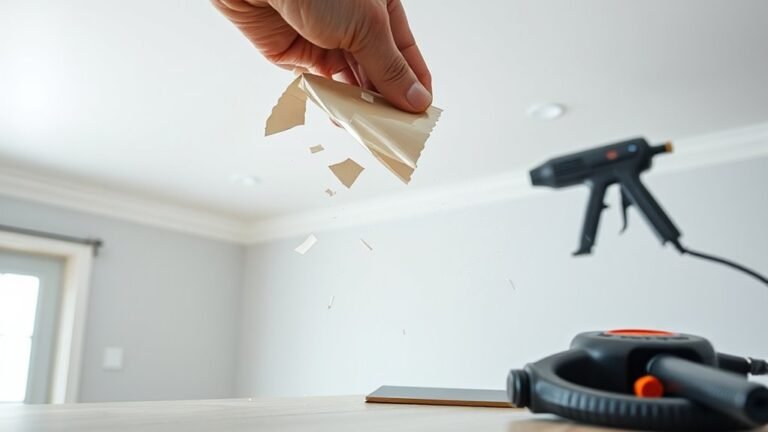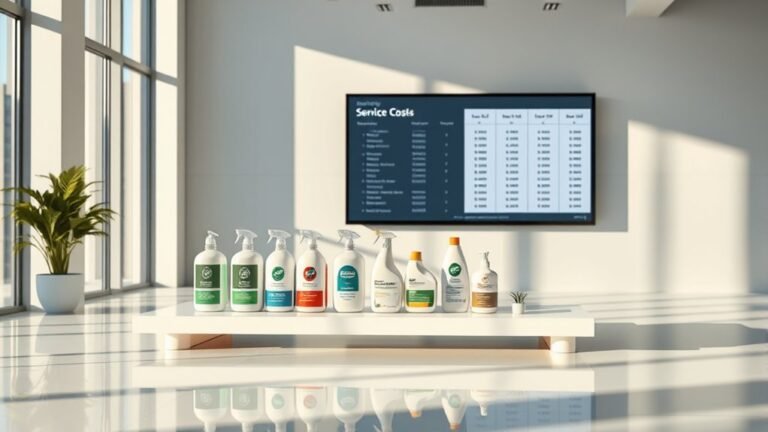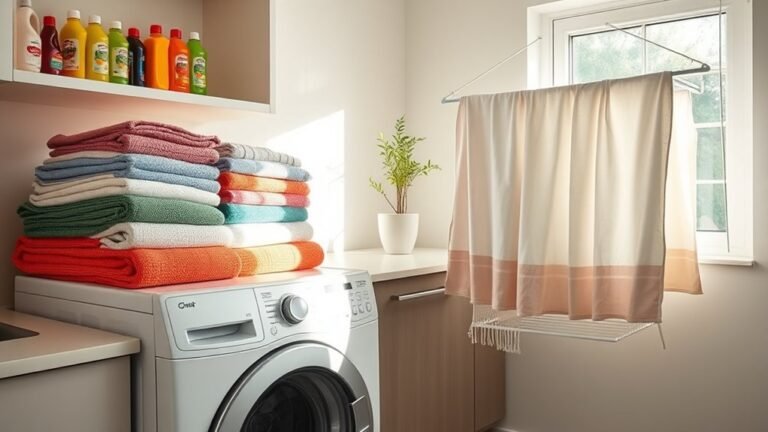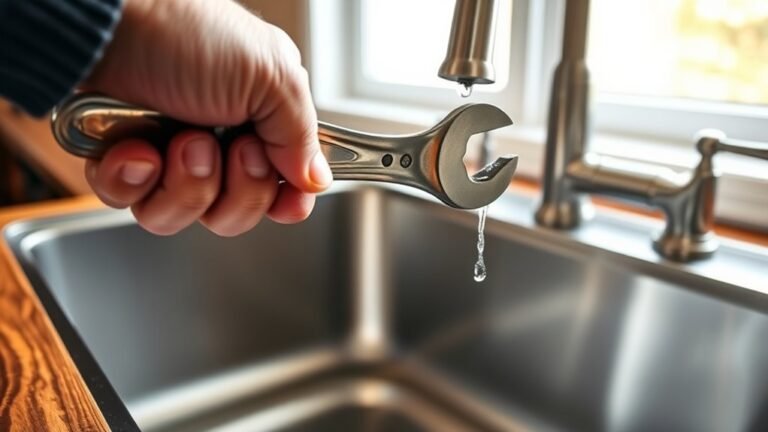How Often to Clean Retainers
You should clean your retainers daily to prevent plaque buildup and maintain good oral health. Rinse them under lukewarm water, and use a soft-bristle toothbrush with mild dish soap or a specialized cleaning solution. Weekly, soak them in a mixture of water and white vinegar for deeper cleaning. This routine not only keeps your retainers fresh but also extends their lifespan. There’s more to learn about maintaining your retainers effectively, so continue to explore the details.
Preparation For Cleaning
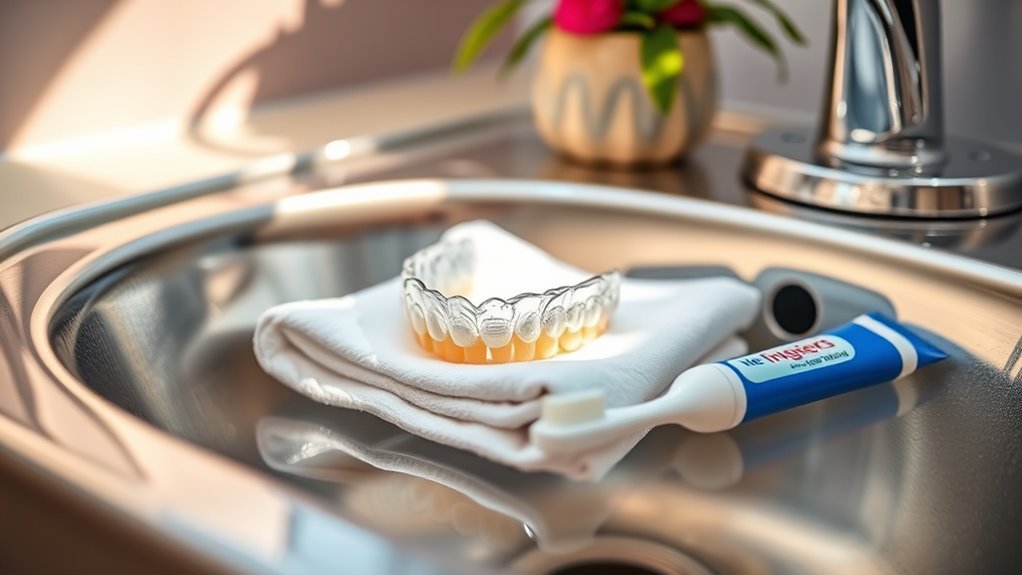
Before diving into the cleaning process, it’s vital to gather the right supplies to guarantee your retainers stay in top shape. Establishing a cleaning schedule is essential; daily care prevents buildup and extends the life of your retainers. You’ll need a soft toothbrush, a gentle cleaning solution, and possibly a dedicated retainer case.
When choosing cleaning techniques, opt for methods that won’t damage the material. Avoid harsh chemicals and abrasive scrubbing, as these can compromise the integrity of your retainers. Instead, consider soaking your retainers in a vinegar solution or using specialized retainer cleaners. By preparing adequately and sticking to your cleaning schedule, you help assure your retainers stay fresh and functional, granting you the freedom to smile confidently.
Tools and Chemical Required
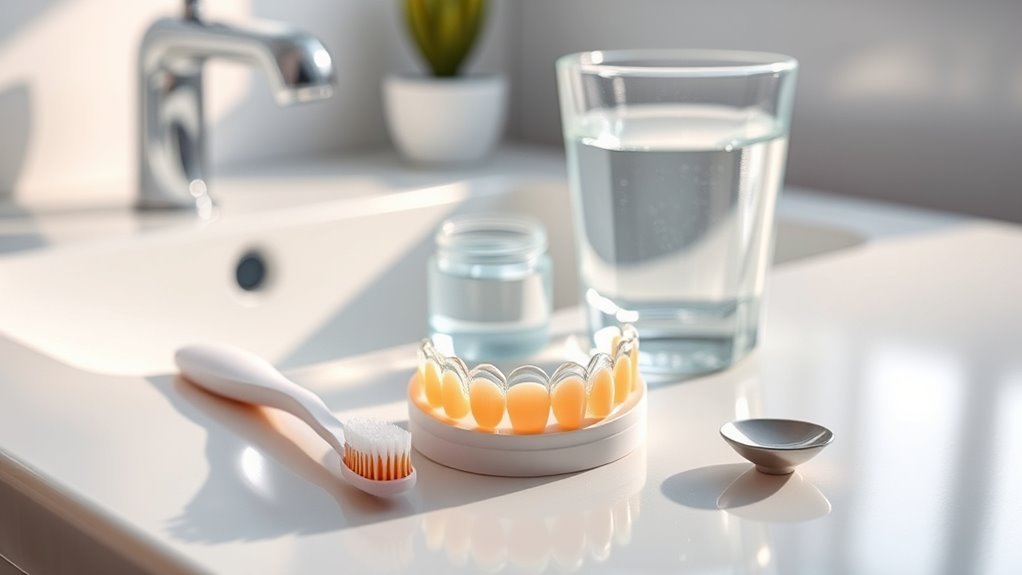
To effectively clean your retainers, you’ll need a few essential tools and chemicals that guarantee both cleanliness and safety. Regular cleaning is important to maintain your oral health, so having the right supplies is essential.
Here’s a quick overview of what you’ll need:
| Tool/Chemical | Purpose |
|---|---|
| Soft-bristle toothbrush | Gentle scrubbing |
| Mild dish soap | Basic cleaning solution |
| White vinegar | Natural disinfectant |
| Baking soda | Odor neutralizer |
| Retainer cleaning tablets | Deep-cleaning solution |
Using these cleaning solutions on a consistent basis can help you establish an effective cleaning frequency, ensuring your retainers stay fresh and functional.
How to Clean:
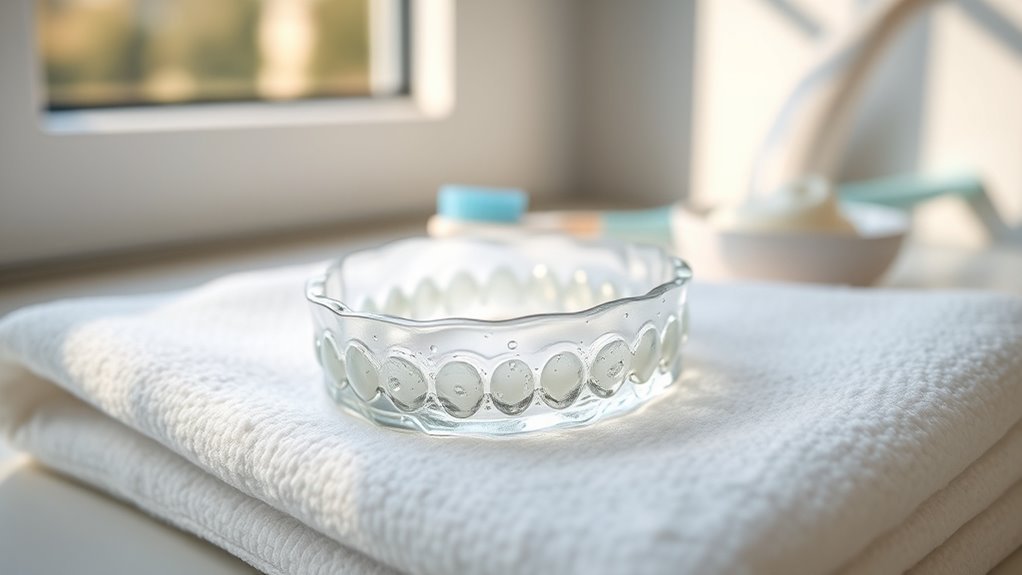
Step 1: Rinse Your Retainers
- Begin your cleaning routine by rinsing your retainers under lukewarm water.
- Avoid using hot water, as it can warp the retainer material and affect its fit.
Step 2: Brush Your Retainers
- Use a soft toothbrush that is solely designated for cleaning your retainers.
- Gently scrub all surfaces of the retainers, including the inside and outside, to remove any plaque or debris.
- Do not use toothpaste, as it can be abrasive and may scratch the retainer.
Step 3: Use a Cleaning Solution
- For a more thorough cleaning, apply a mild dish soap or a specialized retainer cleaning solution.
- Follow the instructions on the cleaning solution for the best results, ensuring that you cover all areas of the retainer.
Step 4: Soak Your Retainers Weekly
- Once a week, soak your retainers in a solution made of equal parts water and white vinegar or use a specialized retainer cleaning solution.
- Make sure to follow the manufacturer’s instructions if using a commercial cleaner.
- Let the retainers soak for about 15-30 minutes for optimal cleaning.
Step 5: Rinse Again
– After soaking, remove the retainers from the solution and rinse them thoroughly under lukewarm water to eliminate any residue.
Step 6: Dry and Store
- Allow your retainers to air dry completely before storing them.
- Always store your retainers in a protective case when not in use to keep them safe and clean.
Safety Consideration
While maintaining your retainers is essential for oral hygiene, it’s equally important to be mindful of safety considerations during the cleaning process. Different retainer materials, such as plastic or metal, require specific cleaning methods to avoid damage. For instance, harsh chemicals or abrasive cleaners can degrade the material, leading to cracks or discoloration. Always check the manufacturer’s guidelines for recommended cleaning products and methods. Additionally, guarantee you’re cleaning your retainers at the appropriate frequency to prevent bacterial growth, which can affect your oral health. Regularly inspect your retainers for wear and tear, and replace them as needed. By prioritizing safety, you can enjoy your retainers without compromising their integrity or your health.
Frequently Asked Questions
Can I Use Toothpaste to Clean My Retainer?
You shouldn’t use toothpaste to clean your retainer. It can be abrasive and may scratch the surface, leading to buildup and bacteria growth. For proper cleaning, opt for a gentle soap or a specialized retainer cleaner. This guarantees effective retainer care without damaging it. Regularly cleaning your retainer is essential for maintaining oral hygiene and prolonging its lifespan, so make certain you choose the right products for the best results.
How Often Should I Replace My Retainer?
When it comes to replacing your retainer, don’t wait until the last minute. Typically, retainers have a lifespan of about 1 to 3 years, depending on wear and tear. Keep an eye out for replacement signs like cracks, discoloration, or a poor fit. If you notice any of these issues, it’s time to talk to your orthodontist. Staying proactive guarantees your smile stays in top shape, giving you the freedom to shine confidently.
What Should I Do if My Retainer Smells Bad?
If your retainer smells bad, it’s essential to clean it using effective cleaning methods. Start by rinsing it with lukewarm water and brushing gently with a soft toothbrush. You can also soak it in a mixture of water and mild dish soap or use specialized retainer cleaning tablets. To prevent odors, remember to clean your retainer daily and store it in a dry, ventilated case. Regular maintenance keeps your retainer fresh and odor-free.
Can I Clean My Retainer With Mouthwash?
While it might seem like a quick fix, using mouthwash to clean your retainer isn’t the best choice. Mouthwash effectiveness can vary, and its strong ingredients may damage your retainer over time. For ideal retainer hygiene, stick to cleaning solutions specifically designed for dental appliances. Regularly cleaning with mild soap and water or a dedicated retainer cleaner will keep it fresh and prolong its life, ensuring your smile stays bright without any fuss.
Is It Safe to Boil My Retainer for Cleaning?
No, it’s not safe to boil your retainer for cleaning. Boiling can warp or damage retainer materials like plastic or acrylic, compromising their fit and effectiveness. The boiling risks include altering the shape, which can lead to discomfort or ineffective alignment of your teeth. Instead, use room temperature water and a gentle cleanser specifically designed for dental appliances to keep your retainer clean while preserving its integrity.
